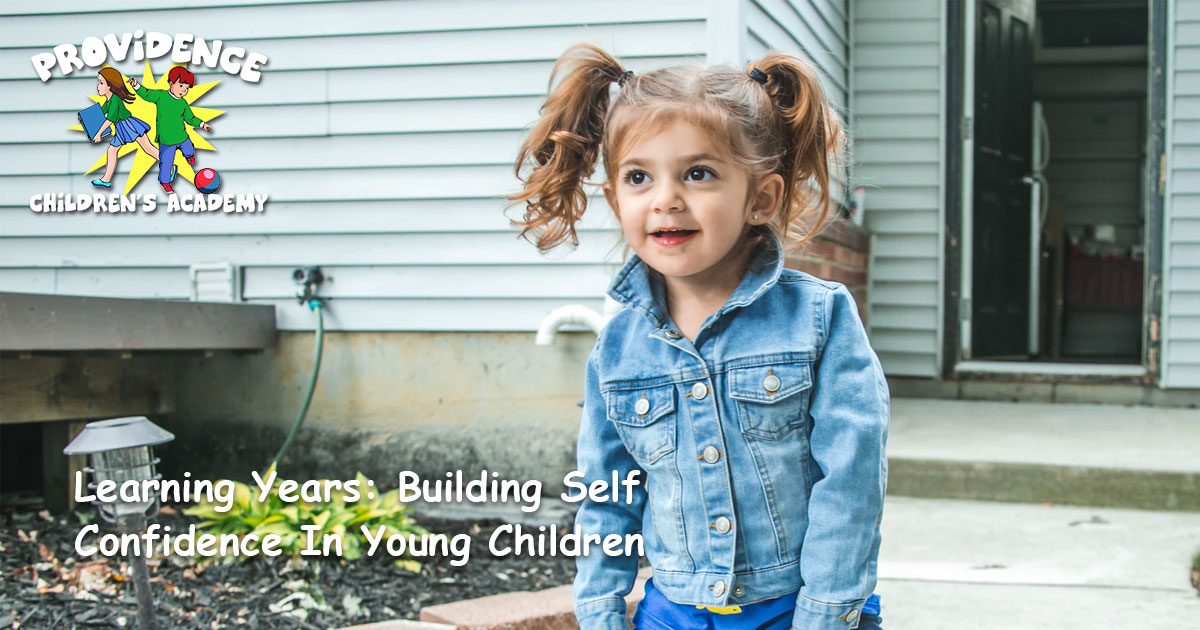
Having good self-esteem ties directly into building self-confidence. Although important at any age, nurturing self-esteem during your child’s learning years gives them the confidence to explore the world around them as they get older.
Having self-esteem means having confidence in your abilities and worth, and it is closely linked to how capable and acceptable your child feels on a day-to-day basis. A good preschool will nurture your child’s self-confidence and assist you, the parent, in helping them discover how important and valuable they are.
What Does Self Confidence Look Like?
Certain behaviors are telltale signs of self-confidence, or a lack of it. Knowing them can help you figure out how your child feels about himself/herself.
Children with good self-esteem:
- feel accepted
- feel confident in themselves and their abilities
- believe they are capable
- think positively about themselves
- feel proud of their abilities and talents
Children with bad self-esteem:
- are highly critical of themselves
- feel that they are not as good as other kids
- fixate on times they have failed or struggled to do something
- lack confidence
- doubt their abilities and talents
Why Is Self Confidence Important?
When you have an inherent confidence in yourself, you are open to new experiences and situations. A child in their learning years with good self-esteem will be proud of what they already can do and won’t be too scared of failure to try to do things they haven’t done before. Self-confidence gives children the space to make mistakes and learn from them.
Children with good self-esteem are also less likely to shy away from new people in fear of not being accepted and will stand up for themselves if they are being treated badly.
Where Does Self Confidence Come From?
Building self-esteem can begin as early as infancy. Sometimes self-confidence begins simply because a child feels safe and loved, while other times they need a push to start believing they are acceptable. Wherever your child is on their self-confidence journey, you can help them to develop it further.
Here are a few things that can increase children’s self-esteem:
- learning a new skill
- learning something new at school
- making friends and having fun together
- trying hard at something
- being included
- feeling understood
- feeling accepted by their family or peers
- receiving praise
- making progress towards a goal
How To Help Grow Your Child’s Self-Esteem
Sometimes your child needs a little help with growing their self-confidence. While we know parents can’t increase their children’s self-esteem with the push of a button, we do believe that there are ways to influence it in the right direction. Here are some of our favorite ways to help young children feel good about themselves:
Praise Them Wisely
Praising results can lead kids to believe they aren’t worthy or acceptable unless they’re achieving and praising fixed qualities (such as being athletic or smart) can backfire if they grow out of that natural ability. Praise the effort that your child puts into something, and their attitude throughout the process. This type of praise encourages them to put in their best effort, and to keep trying when things don’t work right away.
Giving the right type of praise doesn’t always come naturally but is worth learning how to do!
Criticize Actions, Not Character
Constructive criticism is a healthy part of life, and your child will benefit from learning how to receive it with grace and openness. Make sure you aren’t commenting on their character, but rather their questionable actions. For example, instead of saying, “You are being a bully,” you would say, “What you are doing is bullying.”
Harsh words won’t be helpful unless your child can clearly see how to change their actions in order to improve. Be patient while they figure out how to do better next time.
Mistakes Aren’t Bad
Making mistakes is a huge part of the learning years. Teaching your child that mistakes and failures are not the end of the world will help them tremendously as they grow older!
When your child makes a mistake, help them figure out the “next time.” For example, if they spill paint and stain the floor, next time they can put down newspaper before painting.
Encourage Exploration
There are things that come to us naturally, and then things that just… don’t. Encourage your child to explore both of these types of activities.
Next, ask them how they feel while doing the activity. If they come last in every race but love how it feels to run, then they should keep running. If they sing like a bird but find choir frustrating and don’t enjoy it, then it might be worth looking into other things to keep them busy.
Learn More About Self Confidence During The Learning Years
Your child’s self-esteem is worth investing time in. At Providence Children’s Academy, we do our utmost to help nurture your child’s developing self-confidence. Family owned and operated, you can rest assured that your child is in good hands. Contact us today at (954) 570-6914 for more information.
